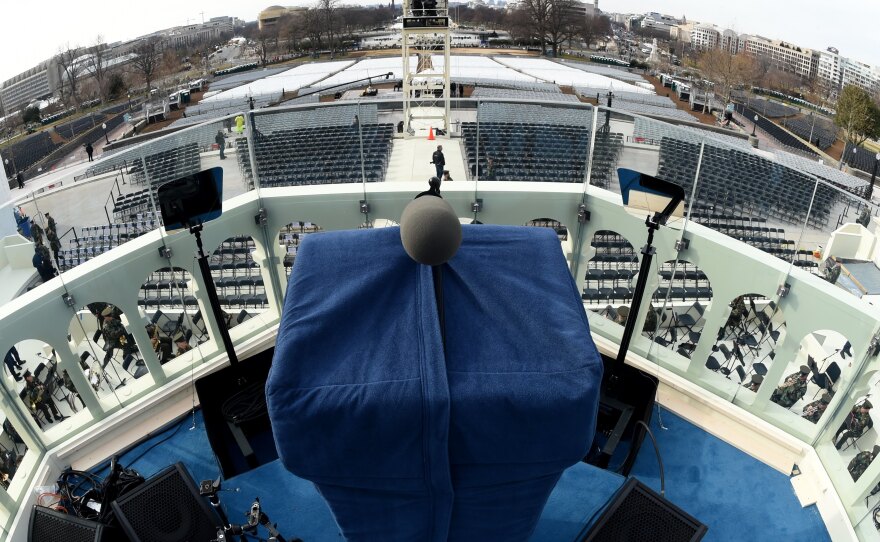
Earlier this week, Sen. Marco Rubio, R-Fla., complained that he was in the dark about the Trump administration's restrictive new policies affecting immigrants, refugees and other travelers from seven majority-Muslim countries.
Rubio said he had been flooded with questions about cruise liners and airport travel, but didn't have many answers: "In fact my staff was told the State Department, as of today, was ordered not to talk to Congress about this issue."
"That cannot be a permanent position," said Rubio. "We expect answers here fairly soon, because we have constituents calling."
The Trump White House has taken such direct, adversarial aim at the news media that it may obscure a more fundamental concern of transparency advocates: whether the administration is constricting the flow of reliable information to the public.
For the record, State Department spokesman Mark Toner said the department had been in contact with lawmakers and would "provide information and assistance as we are able."
Left unsaid: The White House shared little information with officials at State, Homeland Security and other departments and agencies. (White House press secretary Sean Spicer did not reply to a request for comment about the administration's approach about distributing information.
Rubio's constituents and the broader public were left without the information they needed to function. Officials in the United States and abroad had travelers detained without disclosing where they were being held, leaving loved ones, colleagues and even lawyers in the dark. Sen. Cory Booker, D-N.J., said a federal customs official hung up the phone on him.
The bedlam over immigration — which triggered lawsuits, and on Friday night a federal judge's stay — is a case study in how a failed flow of information affects how society functions and judges its government. Even some officials sympathetic to the impulses leading to Trump's immigration policy, such as Rubio, say the way it was handled will affect its results.
"I think he's going to try to persuade the public overtly that they're better off ignorant."
On the campaign trail, Trump was a dogged advocate for accountability and disclosure. Where were Hillary Clinton's speeches behind closed doors to Wall Street financiers, he asked? Why had she used private email servers instead of ones maintained by the government? What had Clinton done as secretary of state for her foundation's donors?
Once elected, Trump has shown little inclination to embrace transparency for his own administration.
"I think we're going to be seeing some real out-of-the-box moves here," said Lucy Dalglish, dean of the University of Maryland's Merrill College of Journalism and former executive director of the Reporters Committee for Freedom of the Press. "It'll be more along the lines of the president's standing up at a rally somewhere and saying, 'Who needs this information? It's the evil media that wants to know this information, you don't need it. No!' And I think he's going to try to persuade the public, overtly, that they're better off ignorant."
Indeed, last month Trump told reporters at a press conference in Manhattan that journalists are the only people who care about his tax returns — though he previously had promised to disclose those forms once federal authorities are done auditing them.
(Trump has not released any documentation proving he is in fact being audited, for that matter, and IRS officials, who do not publicly confirm specific audits, say there is no requirement he keep his returns confidential during an audit.)
In recent weeks, top aides have said Trump will not release his tax records at all, saying reporters instead should look at the less-specific federal disclosure forms that were released during the campaign.
Shuttering or scrubbing online channels
During this week's outcry over immigration, the delay in putting out the specific terms of the new policy led to mass confusion at airports around the world. No one was clear on the policy's implications — or even, initially, on its language.
Transparency advocates point to other warning signs as well. Trump toughened ethics rules for White House staffers, yet he ditched a rule from the Obama years that posted the names of all staffers who received exemptions from ethics requirements.
In addition, in the first days of the new administration, some government agencies were directed to stop using social media channels. Others changed or dropped web pages, even those conveying scientific information; some of their tweets and posts were seen as taking digs at the new president for such positions as his rejection of established science on climate change, for example.
Each presidential transition triggers a centralization of public relations messaging, but this development raised flags with transparency advocates.
"The administration continues to be in what feels like campaign mode," says Alex Howard, deputy director of the Sunlight Foundation, "not only in terms of how they're communicating with the press and the public but also assaulting the press and denying information to the public."
Don't like the data? Legislate it away.
Howard's advocacy group takes the position that a country's government functions most honestly and effectively when its citizens know precisely what's going on.
Howard's concerns for the digital age boils down to a list like this:
- Is data gathered by the government available to the public in a timely and easily accessible way?
- Is that data presented accurately?
- Is it protected from political interference?
- And finally: Is that information actually gathered at all?
Howard noted that one bill proposed in the U.S. House of Representatives would shut down gathering information on housing discrimination. Other proposals circulating inside the administration could limit what research would be funded to monitor climate change.
"That kind of dumbing-down of government information has the potential to take away our ability to create shared facts about what's changing in our society, and to have an informed public debate about what should be done," Howard said.
Secrecy as security
The flow of information to the public often seesaws back and forth between presidencies. In recent decades, Democrats Bill Clinton and Barack Obama pursued more expansive definitions of freedom of information; Republican George W. Bush restricted it. Yet even as Obama made more databases digitally available, reporters say agencies during his tenure often jealously guarded their information.
Trump appears to be putting his thumb back on the scale, Dalglish said.
"This feels to me a lot like the atmosphere we were facing immediately after 9/11," Dalglish said. "There was just a much bigger move toward pushing secrecy in the name of security."
At an event at the Sundance Festival, New York Times investigative reporter James Risen also pointed to the priority placed on national security by the George W. Bush administration after the September 2001 terror attacks. Prosecutors during the Bush years, and then especially under Obama, pursued leaks cases in ways that discouraged sources from sharing information with news organizations. A record number of reporters found themselves in court facing legal jeopardy.
"It can be overwhelming to be a citizen and try to digest and interpret all of this [information] on your own," Dalglish said. "But we expect our citizens to go to the ballot box and make decisions about how we're going to govern ourselves and how we're going to treat each other in this society.
"If we don't have access to timely, quality, fact-based information," she said, "we will not have the ability to go to the polls and make those decisions."
Copyright 2017 NPR. To see more, visit http://www.npr.org/.






